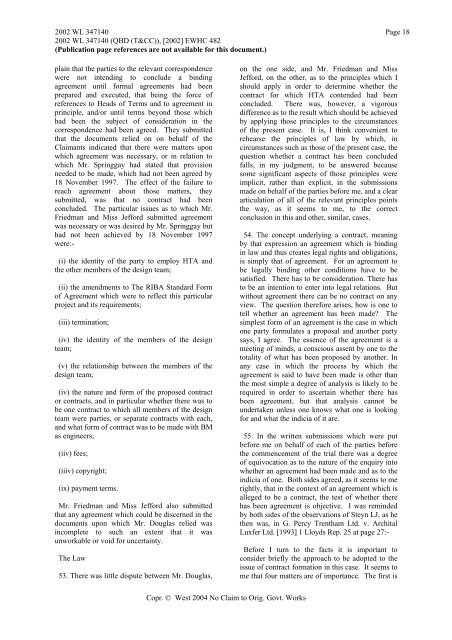Tesco v Constain - Thomson Reuters
Tesco v Constain - Thomson Reuters
Tesco v Constain - Thomson Reuters
You also want an ePaper? Increase the reach of your titles
YUMPU automatically turns print PDFs into web optimized ePapers that Google loves.
2002 WL 347140 Page 182002 WL 347140 (QBD (T&CC)), [2002] EWHC 482(Publication page references are not available for this document.)plain that the parties to the relevant correspondencewere not intending to conclude a bindingagreement until formal agreements had beenprepared and executed, that being the force ofreferences to Heads of Terms and to agreement inprinciple, and/or until terms beyond those whichhad been the subject of consideration in thecorrespondence had been agreed. They submittedthat the documents relied on on behalf of theClaimants indicated that there were matters uponwhich agreement was necessary, or in relation towhich Mr. Springgay had stated that provisionneeded to be made, which had not been agreed by18 November 1997. The effect of the failure toreach agreement about those matters, theysubmitted, was that no contract had beenconcluded. The particular issues as to which Mr.Friedman and Miss Jefford submitted agreementwas necessary or was desired by Mr. Springgay buthad not been achieved by 18 November 1997were:-(i) the identity of the party to employ HTA andthe other members of the design team;(ii) the amendments to The RIBA Standard Formof Agreement which were to reflect this particularproject and its requirements;(iii) termination;(iv) the identity of the members of the designteam;(v) the relationship between the members of thedesign team;(iv) the nature and form of the proposed contractor contracts, and in particular whether there was tobe one contract to which all members of the designteam were parties, or separate contracts with each,and what form of contract was to be made with BMas engineers;(iiv) fees;(iiiv) copyright;(ix) payment terms.Mr. Friedman and Miss Jefford also submittedthat any agreement which could be discerned in thedocuments upon which Mr. Douglas relied wasincomplete to such an extent that it wasunworkable or void for uncertainty.The Law53. There was little dispute between Mr. Douglas,on the one side, and Mr. Friedman and MissJefford, on the other, as to the principles which Ishould apply in order to determine whether thecontract for which HTA contended had beenconcluded. There was, however, a vigorousdifference as to the result which should be achievedby applying those principles to the circumstancesof the present case. It is, I think convenient torehearse the principles of law by which, incircumstances such as those of the present case, thequestion whether a contract has been concludedfalls, in my judgment, to be answered becausesome significant aspects of those principles wereimplicit, rather than explicit, in the submissionsmade on behalf of the parties before me, and a cleararticulation of all of the relevant principles pointsthe way, as it seems to me, to the correctconclusion in this and other, similar, cases.54. The concept underlying a contract, meaningby that expression an agreement which is bindingin law and thus creates legal rights and obligations,is simply that of agreement. For an agreement tobe legally binding other conditions have to besatisfied. There has to be consideration. There hasto be an intention to enter into legal relations. Butwithout agreement there can be no contract on anyview. The question therefore arises, how is one totell whether an agreement has been made? Thesimplest form of an agreement is the case in whichone party formulates a proposal and another partysays, I agree. The essence of the agreement is ameeting of minds, a conscious assent by one to thetotality of what has been proposed by another. Inany case in which the process by which theagreement is said to have been made is other thanthe most simple a degree of analysis is likely to berequired in order to ascertain whether there hasbeen agreement, but that analysis cannot beundertaken unless one knows what one is lookingfor and what the indicia of it are.55. In the written submissions which were putbefore me on behalf of each of the parties beforethe commencement of the trial there was a degreeof equivocation as to the nature of the enquiry intowhether an agreement had been made and as to theindicia of one. Both sides agreed, as it seems to merightly, that in the context of an agreement which isalleged to be a contract, the test of whether therehas been agreement is objective. I was remindedby both sides of the observations of Steyn LJ, as hethen was, in G. Percy Trentham Ltd. v. ArchitalLuxfer Ltd. [1993] 1 Lloyds Rep. 25 at page 27:-Before I turn to the facts it is important toconsider briefly the approach to be adopted to theissue of contract formation in this case. It seems tome that four matters are of importance. The first isCopr. © West 2004 No Claim to Orig. Govt. Works
















